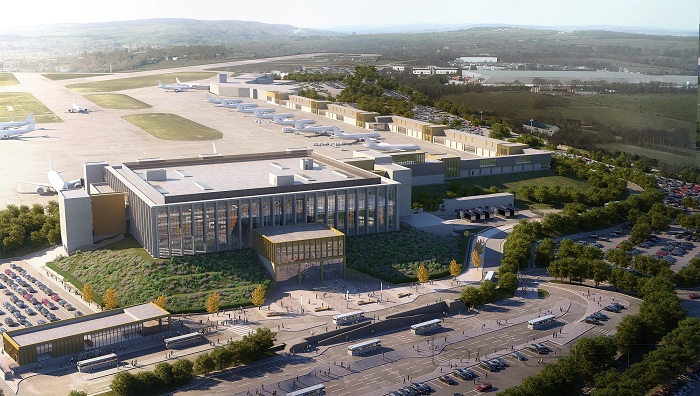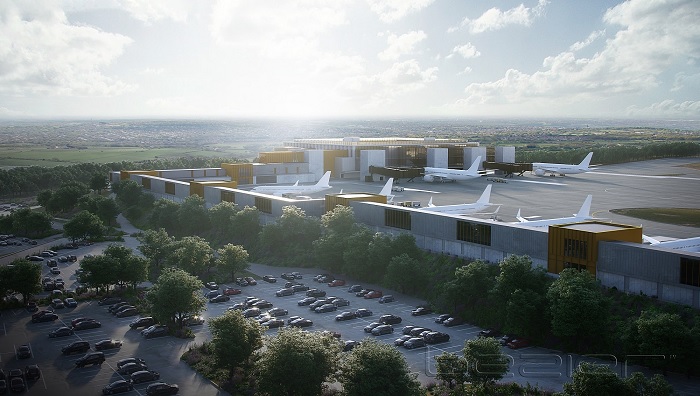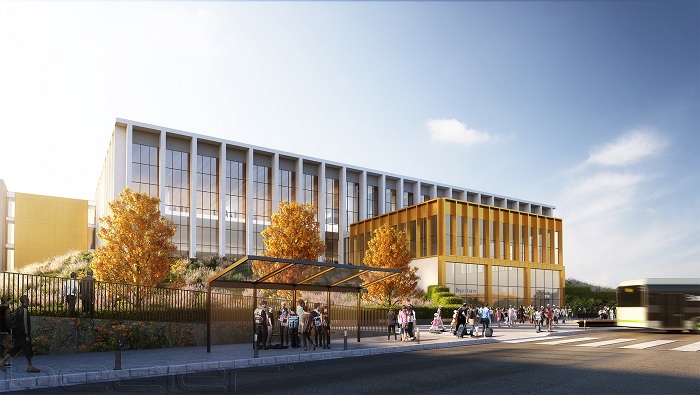90 academics have signed an open letter calling on Leeds City Council to block the plans for a new terminal at Leeds Bradford International Airport. The letter was sent to West Leeds Dispatch by Bramley-based academic and environmental campaigner Paul Chatterton.
UPDATE: People have also today been encouraged to support the plans for a carbon neutral terminal by 2023, which will secure the long term future of the airport and the jobs it supports.

An economic recovery based on sustainability is the only way we can address the post Covid-19 challenges ahead – and the wider challenge of climate change.
We call on Leeds City Council to lead the way, and reject the expansion of Leeds Bradford Airport
The Covid-19 epidemic has exposed just how vulnerable we are as individuals and as a society. It has caused immense suffering, pushed our health service to the brink and shredded our economy. It is an unmitigated human disaster. But the next crisis, the climate crisis, will be far worse, unless we make the right decisions now.
Huge investment is needed to get the economy back on its feet, but we simply cannot afford to return to ‘business as usual’. We cannot afford to prop up the carbon emitting industries that will hasten climate breakdown. We need a low-carbon recovery supported by central government.
But we also call on Yorkshire councils, unions and businesses to take the lead. In Leeds, the City Council can start by rejecting the expansion of Leeds Bradford Airport (LBA), an expansion that would double carbon emissions from flights, and make it impossible for the city to meet its carbon reduction target.

LBA does not represent value for money in terms of an employment centre. Larger employment gains, as well as other benefits, are more likely to be created from investing in the local economy.
While LBA’s owners have consistently drawn attention to the low carbon credentials of the new terminal building, this is a ‘grain of sand’ compared to greenhouse gas emissions from the aircraft.
And now researchers at Leeds University have found that the planning application submitted by LBA has grossly minimised the impact of aircraft emissions – by at least a factor of 4.
This has been achieved by:
- 1. Looking at departures only, and ignoring arrivals, for the proposed extra flights, so half of the passengers have been omitted,
- 2. Not accounting at all for the large global warming effect of non-CO2 emissions at altitude;
- 4. Ignoring the cumulative effect of emissions beyond 2030, despite CO2 staying in the atmosphere for many decades
- 5. Omitting international flights (more than 90% of the flight emissions associated with LBA) when comparing them to national carbon targets and to the Leeds Zero Carbon Roadmap;
- 6. Exaggerating future efficiency improvements in aviation compared to what the UK Committee on Climate Change considers plausible.
There are no low-emission aviation technologies available now, and none will be available within the timescales available to combat climate breakdown, meaning that any expansion of aviation goes against the UK’s net-zero goal.
This is the reason the UK Court of Appeal refused Heathrow’s third runway, and it holds just as strongly for LBA’s expansion. The imperative of reducing carbon emissions and preventing dangerous climate change, strongly supported by the Leeds Citizens Jury on Climate Change, should be recognized by Leeds City Council.
As Leeds North West MP Alex Sobel has stated: “A net increase of pollution from the airport due to an increase of flights will undermine the city in its policy to meet net zero carbon by 2030 and will impact the air quality.”
Instead, we need to invest in a fairer, local and sustainable economy – one that can safeguard our long-term future.
Many projects, such as home insulation and electric charging points, are ready to go and they have been shown to create more jobs, deliver higher returns and lead to increased long-term cost savings.

Leeds City Council could provide support and funding for co-operatives and community businesses in activities such as renewables and home retrofit.
These offer the potential for large employment gains and will address inequalities by locking wealth into inner city communities. If employment is localised, then travel to work will be minimised and this would also address other pressing issues around air quality and public health issues around inactivity.
By contrast, LBA does not offer these benefits nor represent value for money. There is also very limited evidence that the airport site offers any kind of trickle down or local economic benefit. The associated transport infrastructure is incomplete, poorly sited and likely to produce greater reliance on car based journeys.
It is no exaggeration to say that the decisions we make in the next few months will have a profound impact on our lives, and those of our children, for thousands of years.
A low-carbon economic recovery can repair the economic damage done by Covid-19 and put the world on track to tackle climate breakdown. This is a pivotal moment and we urge central and local government to put sustainability at the heart of the post Covid recovery.
Signatories
- Professor Julia Steinberger, School of Earth & Environment, University of Leeds.
- Professor Paul Chatterton, School Geography, University of Leeds.
- MSc Jefim Vogel, School of Earth and Environment, University of Leeds
- Dr Declan Finney, School of Earth & Environment, University of Leeds
- Dr Milena Buchs, School of Earth & Environment, University of Leeds
- Professor Barbara Evans, School of Civil Engineering, University of Leeds
- Dr Ben Rabb, School of Earth & Environment, University of Leeds
- Dr Marina Baldissera Pacchetti, School of Earth and Environment, University of Leeds
- Professor Robert Vanderbeck, School of Geography, University of Leeds
- Dr. Miklós Antal, School of Earth and Environment, University of Leeds.
- Dr Katy Roelich, School of Earth and Environment, University of Leeds
- Dr Mark Davis, School of Sociology and Social Policy, University of Leeds
- Dr David Williams, School of Earth and Environment, University of Leeds
- Professor Daivd York, FREng, School of Chemical and Process Engineering, University of Leeds
- Dr Jennifer Fletcher, School of Earth and Environment, University of Leeds
- Dr Valerie Dupont, School of chemical and process engineering, the University of Leeds
- Dr Christian Maerz, School of Earth and Environment, University of Leeds
- Dr Diana Ivanova, School of Earth and Environment, University of Leeds
- Professor Oliver Phillips FRS, School of Geography, University of Leeds
- Dr Noel Cass, School of Earth and Environment, University of Leeds
- Dr Adam Booth, School of Earth and Environment, University of Leeds
- Dr Andy Emery, School of Earth and Environment, University of Leeds
- Dr Siân Evans, Research & Innovation Service, University of Leeds
- Dr James Smith, School of Food Science & Nutrition, University of Leeds.
- Dr Sarah Chapman, School of Earth & Environment, University of Leeds
- Dr Rory Padfield, School of Earth and Environment, University of Leeds
- Dr Katy Wright, School of Sociology & Social Policy, University of Leeds
- Professor Megan Povey, School of Food Science and Nutrition, University of Leeds
- Dr Gesa Reiss, School of Biological Sciences, University of Leeds
- Dr Charlotte Evans, School of Food Science and Nutrition, University of Leeds
- Dr George Holmes, School of Earth and Environment, University of Leeds
- Dr Tom Haines-Doran, School of Earth and Environment, University of Leeds
- Dr Martin Dallimer, School of Earth and Environment, University of Leeds
- Professor Mike Kirkby, School of Geography, University of Leeds.
- Professor Greg Marsden, Institute for Transport Studies, University of Leeds.
- Mr Robert Newton, School of Earth and Environment, University of Leeds
- Dr Draško Kašćelan, School of Languages, Cultures and Societies, University of Leeds
- Professor Simon L. Lewis, School of Geography, University of Leeds.
- Dr Aisling Dolan, School of Earth and Environment, University of Leeds
- Professor Nick Malleson, School of Geography, University of Leeds
- Dr Sally Russell, School of Earth and Environment, University of Leeds
- Dr Dominic O’Key, School of Philosophy, Religion and History of Science, University of Leeds
- Dr Natasha Mortimer, School of Earth and Environment, University of Leeds
- Professor Andy Challinor, School of Earth and Environment, University of Leeds
- Dr Sarah Batterman, School of Geography, University of Leeds
- Professor Julia Martin-Ortega, School of Earth and Environment, University of Leeds
- Dr Cat Scott, School of Earth and Environment, University of Leeds
- PhD Charlotte Weaver, School of Chemical and Process Engineering, University of Leeds
- Dr Ann-Kristin Koehler, School of Earth and Environment, University of Leeds
- Professor Mike Pilling, School of Chemistry, University of Leeds
- Dr Lucie Middlemiss, School of Earth and Environment, University of Leeds
- Professor Alan Mackie, School of Food Science and Nutrition, University of Leeds
- Anna Lewandowska, Research & Innovation Service, University of Leeds
- Kara Hazelgrave, Research & Innovation Service, University of Leeds
- Dr Chris Smith, School of Earth and Environment, University of Leeds
- Dr Natasha Barlow, School of Earth and Environment, University of Leeds
- Seb O’Connor, School of Fine Art, History of Art and Cultural Studies, University of Leeds
- Dr Jonathan Busch, School of Earth & Environment, University of Leeds
- Julia Ankenbrand, School of Fine Art, History of Art and Cultural Studies, University of Leeds
- Dr Jennifer Saxby, School of Earth and Environment, University of Leeds
- PhD Anya Schlich-Davies, School of Earth and Environment, University of Leeds
- PhD Sarah Shallcross, School of Earth and Environment, University of Leeds
- Dr Christopher Lyon, School of Earth and Environment, University of Leeds
- PhD Josephine McSherry, School of Earth and Environment, University of Leeds
- Dr. Giulio Mattioli, Department of Transport Planning, TU Dortmund University, & School of Earth and Environment, University of Leeds
- Professor Sven Schroeder, School of Chemical and Process Engineering, University of Leeds
- Dr Roger Tyers, School of Economic, Social & Political Sciences, University of Southampton
- PhD Steve Westlake, School of Psychology, Cardiff University
- Dr Jennifer A. Rudd MChem MRSC, Energy Safety Research Institute, Swansea University
- Dr Elke Pirgmaier, School of Earth & Environment, University of Leeds
- Dr Louise Jennings, School of Mechanical Engineering, University of Leeds
- Dr Bing Wang, School of Fine Art, History of Art & Cultural Studies, University of Leeds
- Hazel Mooney, School of Earth and Environment, University of Leeds
- Dr Maria Beger, School of Biology, University of Leeds
- PhD Alberto Sanchez-Marroquin, School of Earth and Environment, University of Leeds
- PhD Lamprini Papafoti, Institute for Transport Studies, University of Leeds
- Benjamin Jenner, School of Fine Art, History of Art and Cultural Studies, University of Leeds
- Professor Anne Tallontire, School of Earth and Environment, University of Leeds
- PhD David Barns, School of Chemical & Process Engineering, University of Leeds
- PHD Ian Sullivan, School of Sociology, University of Leeds
- Calum Carson, Leeds University Business School, University of Leeds
- Dr Leif Denby, School of Earth and Environment, University of Leeds
- Associate Professor Dr Sara Gonzalez, School of Geography, University of Leeds
- Dr Christopher Hassall, School of Biology, University of Leeds
- Dr Tony Fowkes, Institute for Transport Studies, University of Leeds
- Dr David Dawson, School of Civil Engineering, University of Leeds
- Tim Joubert, School of Geography, University of Leeds
- PhD Neil McKenna, School of Geography, University of Leeds
- Professor Alexis Comber, School of Geography, University of Leeds
- Dr Pepa Ambrosio-Albala, School of Chemical and Process Engineering, School of Earth and Environment, University of Leeds


I am still not convinced. I want to know how many of these doctors-academics have flown from LBA in say the last 5 years. Or better still have many have flown from any airport in the UK. I wonder if there are any double standards. I wonder how many people I could gather in Leeds and surrounding areas who would agree to the expansion. If the public generally believe it is a good thing for the city, the businesses and the public either for jobs, businesses, and more making Leeds/Bradford and international hub that is efficient, modern and may even take business away from Manchester, it will be a good thing.
I’m glad that people of this profession have spoken out against the expansion of LBA , my wife and I have lived on Wood Hill Road since 1959 we used to be able to enjoy sitting out in our garden on good days but prior to Covid 19 we were constantly listening to aircraft noise,we also wonder how much our houses (under the flight path) suffer from unburnt fuel from planes landing. We definitely would not want the flying hours to be extended as we and thousands of other residents would have their sleep disturbed. On a number of occasions I have complained to Barry Anderson about noisy planes taking off before 07 00 but the airport always replied that they were within guidelines. We hope that for once LCC will take notice of yourselves and local residents. Thank you.
Certainly agree with the academics, we do not need any more noise pollution or more traffic , we live on Scotland lane and the traffic starts early hours of the morning, it’s been wonderful during lockdown seeing families walking and biking, enjoying the country side, also lovely birds back in the garden